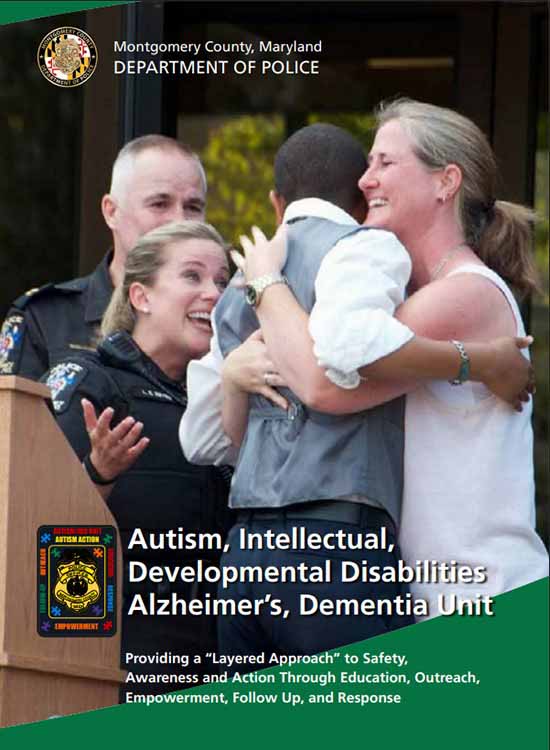Autism/IDD (Intellectual and Developmental Disabilities), Alzheimer's and Dementia Outreach Program
The Montgomery County Police - Autism/Intellectual and Developmental Disabilities (IDD), Alzheimer’s and Dementia Outreach Unit has worked to create what is now a “culture of awareness” in Montgomery County and beyond.
This program began in 2005, partly in response to the growing number of police calls for service involving missing residents with autism/IDD, Alzheimer’s, and Dementia. The program has continued to develop and today provides a “total approach” to issues that these residents and police encounter through Education, Outreach, Follow-up, Empowerment, and Response.
Recorded Webinar with Officer Laurie Reyes and Pathfinders for Autism covering very important wandering safety tips.
All Montgomery County recruits and officers receive training and education on ensuring positive, effective, and safe interactions between law enforcement and the Autism/IDD communities. The unit also works with caregivers and those with Autism/IDD on ways to ensure they are safe in the community. We regularly utilize “self-advocates,” those with autism or other intellectual and developmental disabilities, to assist with our presentations.
Our outreach efforts are quite extensive. We hold community events such as Spectacular Kids Night Out and Autism/IDD Night Out throughout the year. We conduct presentations within and outside of the County. Our outreach aims to provide tools and resources that prepare individuals, caregivers, and the community for effective ways to ensure a safe, meaningful community.
We follow up with caregivers after we receive notice of a call for service involving someone from the autism/IDD, Alzheimer’s, or dementia community. We work with other county and state services that may be able to help.
The MCPD Autism/IDD Wandering Safety Kit: This kit is provided to caregivers and contains wandering prevention tools, including window clings for the door and home and an MCPD safety t-shirt.
One of the program's main goals is to provide a platform for those who don’t always have a voice. We empower our officers, individuals, caregivers, and the community through education and outreach. We incorporate the concerns and questions of those we interact with to develop dynamic curriculums and presentations. We utilize “self-advocates,” those with autism or other intellectual and developmental disabilities, to assist us in instruction for officers and community members.
Through the education of our officers on ways to ensure positive and safe interactions with those who have autism/IDD, Alzheimer’s, and dementia, we are confident in the ability of our officers to provide an effective response to both general calls for service and calls for missing at-risk persons in the community.
How to prevent wandering and prepare for such an event
- Install an alarm if possible. An alarm is a great resource. Many times, caregivers are not aware that their loved one has left the home, especially during the evening and overnight hours when “sundowning” (a state of confusion occurring in the late afternoon and spanning into the night that can cause a variety of behaviors to include wandering) is common. An alarm is also essential during the day when caregivers may be distracted. Magnetic door alarms are also a good option if you cannot afford a professionally installed alarm. They are inexpensive and readily available.
- Reach out to neighbors for support. If you are comfortable, we encourage you to talk to your neighbors about your situation. Neighbors can be a great resource and be a “lookout” should your loved one decide to wander. You can give your cell phone number to your neighbors or request they call 911 if they think your loved one needs assistance. Have neighbor letters (available in English and Spanish) ready. Letters are available in the " Resources for Families" section of the page.
- Create a 9-1-1-script.
- Make sure the loved one has identification on them at all times. Identification can take many forms and does not necessarily need to be an official document. Make a durable identification card with permanent ink, have the loved one wear an ID bracelet, or write information on the loved one’s clothing. Remember to include your contact information.
- Take full-length and head-shot photographs of your loved one. Store the photos electronically so that if your loved one wanders, the images can be sent to law enforcement quickly.
- Call 9-1-1 immediately if your loved one has wandered so that police can respond. Do not wait to call 9-1-1. In some instances, families will first try and search for their missing loved ones without assistance and feel they can’t call emergency responders for assistance immediately. When you don’t immediately call 9-1-1, precious time is lost, which could lead to a tragic ending.
Resources For Families

Download the Autism Brochure (pdf)
- 911 Script
- Making the Right Call - 911 contact information
- Neighbor Letter for Autism/IDD in English
- Neighbor Letter for Autism/IDD in Spanish ( coming soon..)
- Neighbor letter for Alzheimer’s in English
- Neighbor Letter for Alzheimer’s in Spanish ( coming soon..)
- Dementia and Wandering pamphlet
- Special Olympics of Maryland pamphlet
- Drivers with Disabilities Information

